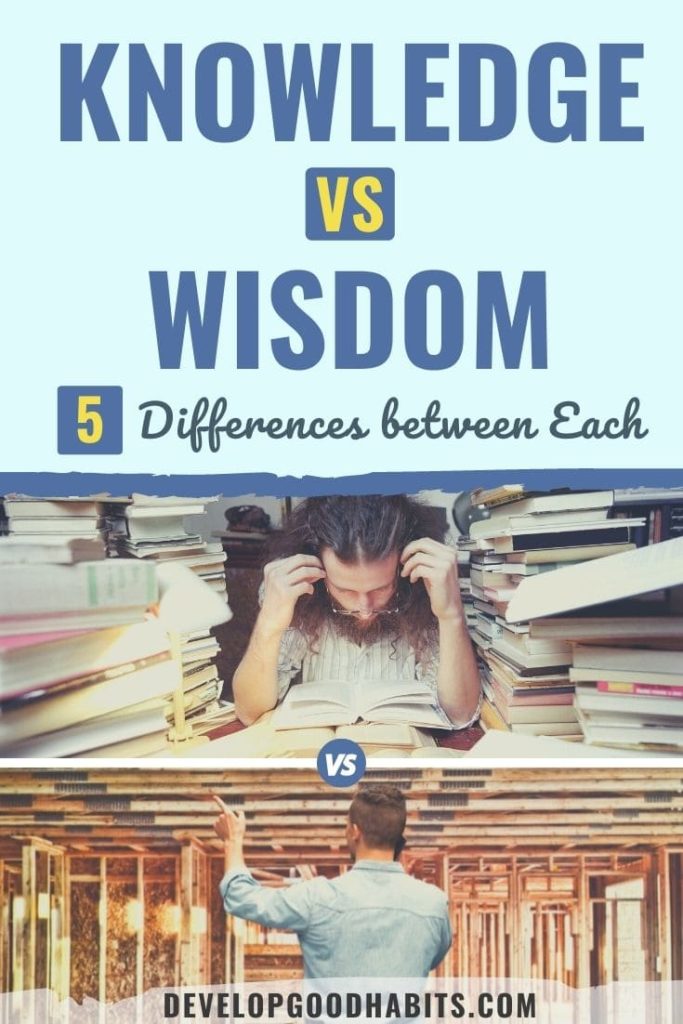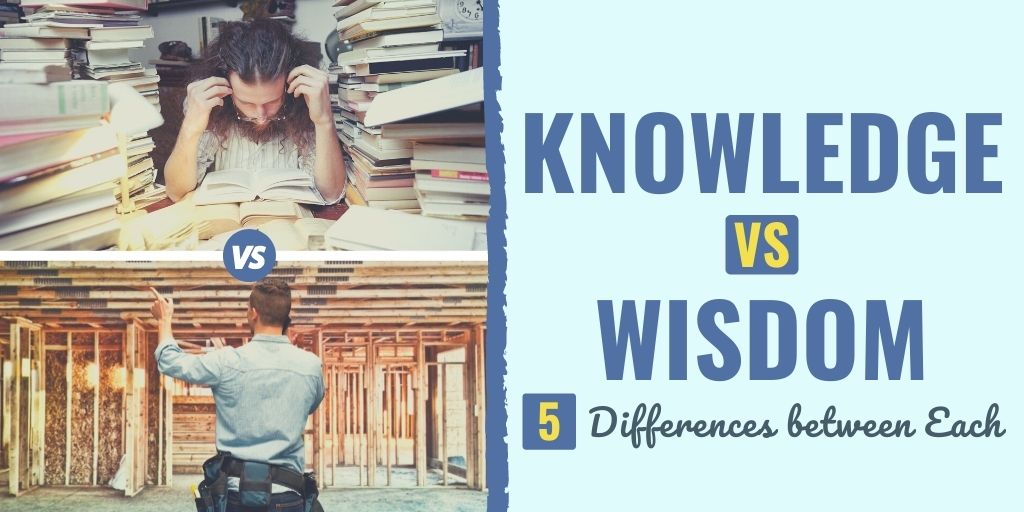There might be affiliate links on this page, which means we get a small commission of anything you buy. As an Amazon Associate we earn from qualifying purchases. Please do your own research before making any online purchase.
We often hear the words knowledge and wisdom used interchangeably. While these two words are both nouns, this is one of the few things they have in common.
The word wisdom was used as far back as before the year 900. Knowledge, on the other hand, didn't come into use until around 1300. During that time, it was philosophers who spent any amount of time trying to understand such concepts.
It is important to note that a person can have knowledge without having wisdom. The reverse, however, is not true. Today, we are going to take a look at how the subtle differences between these two can actually make a big difference in the end.
What is Knowledge?
Knowledge is the information that you learn from sources such as textbooks, the Internet, videos, etc. It is the accumulation and understanding of facts and truths, or what is perceived to be so. It has been said that knowledge helps you know if a fact is true or false. With enough available information and time, most people can gain knowledge.
Getting a degree in Psychology is an example of knowledge. You are given information about how the typical person behaves in a typical circumstance. You may learn that a certain percentage of the population is diagnosed with one disorder or another. You may also learn what medications are typically prescribed for certain disorders. You may learn about what presumably causes racism and the textbook idea of how to go about addressing the subject.
Yet another example of knowledge is learning how to do something like fish. You learn that you need to put the bait on the hook, and may even learn what kind of bait different fish prefer. You learn how to cast your line and reel it in. You may even have participated in some simulations. You have knowledge of how fishing is supposed to happen.
Some common synonyms for knowledge include ability, awareness, education, expertise, grasp, and familiarity.
What is Wisdom?
Wisdom is the ability to take the knowledge you have and apply experience, common sense, and judgment to see if that knowledge is appropriate for the current situation. It is putting knowledge into practice and learning from the results that you experienced. Wisdom is about discerning whether an action is true or right.
Let's take a look at the psychology example again. Daryl Davis didn't have the knowledge that comes from a textbook. He learned about racism at an early age, and he was taught that the only solutions to racism were to run or retaliate in anger. Yet, he saw those things didn't work. He looked around at the people he knew and saw that kindness so often worked better, and quicker, than violence. He saw that when people felt heard, they in turn listened. Taking the knowledge he had gained, he spoke with a KKK member. He listened, and he spoke. Eventually, not only that man but others also walked away from that way of thinking. Davis used wisdom to choose his method of approach.

Now, let's revisit the fishing example from above. You are pretty confident you have learned all you need to know to fish successfully. You set out to a local river with your new fishing gear. The current is strong, something you hadn't considered. The wind is picking up and as you attempt to cast your line, the line tangles and you need to put on a new line. You realize it isn't as easy to do as the video made it look. After hours of sitting on the shore, you still haven't caught a fish. When your fishing pole breaks, you go home.
The next time you go fishing, you check the local weather reports. You look at various spots and choose calm water. You also make a point of bringing along an extra line and a second pole. Lastly, you check and see what time is best for catching fish in this area. The trip was a success. You have taken the knowledge you have gained, made decisions based on what did not work the last time, and adjusted your actions. This is wisdom.
Some synonyms for wisdom include caution, experience, foresight, judgment, and prudence.
5 Differences between Knowledge and Wisdom
They say that knowledge is knowing what to say and wisdom is knowing when to say it. This is a simplified version that shows the difference between the two. Let's look at some of the major differences between knowledge vs wisdom.
Difference #1: It's All About Perspective
Knowledge is about knowing the facts. You know what the situation appears to be. You know what you have been told is the proper action to take or the proper reaction. Yet, things don't always go the way they are “supposed” to go. You have read all the child-rearing books and know you are supposed to allow your teenager to make decisions for themselves whenever possible so that they can learn to deal with life.
When your 14-year-old asks to attend a party that starts at 11 at night, you know that things you don't want your child exposed to are likely to occur. Knowledge tells you to trust their decision. Wisdom tells you that the child is likely to be in a situation they can't handle yet. You deny their request. Yes, they need more freedom, but this isn't the correct time to give them that freedom.
Difference #2: Less is More
Knowledge is about adding things. You study, gather information, and the more you do so, the more your brain fills with information. There is no end to what you can learn. On the other hand, wisdom is about taking things away.
As you put your knowledge to use, you get rid of the facts that don't apply to the current situation. You eliminate things that don't work in reality. You throw away theories and assumptions. In the end, the picture is much clearer. Think of it in terms of the story of the peasant who was stealing rice. While people were knowledgeable that one grain of rice was far less than what the person could have, the peasant was wise enough to know that her way of requesting what appeared to be less would result in a greater gain.
Difference #3: Internal vs. External
Knowledge is gained from external sources such as books, teachers, and videos. Wisdom, however, is gained internally by applying judgment, thought, and analysis. You may know that a person has a clogged heart valve and the best course of action is to replace the valve. However, this is for an otherwise normal healthy person.

Wisdom tells you if you are looking at a person who has terminal cancer, who is a high risk for anesthetic and is already wearing a pacemaker, then surgery of this type is beyond dangerous. Wisdom says don't do it.
Difference #4: Consider the Senses
Knowledge comes from what you can gather with your five senses. You can observe, hear, taste, etc. Wisdom comes from internal senses such as emotional responses or feelings garnered from experience with the situation.
Knowledge tells you that someone who is drowning needs to be rescued. Wisdom tells you that if you can't swim, you shouldn't jump in and attempt it yourself.
Difference #5: Passive vs Active
Knowledge is absorbed. You can watch, listen, or read and gain knowledge. On the other hand, wisdom requires action. You need to put the knowledge you have gained to the test.
You need to use judgment and draw conclusions and then change your behavior accordingly. You can't gain wisdom without actively experiencing something for yourself.
Which is Better… Knowledge or Wisdom?
It can be difficult to determine whether knowledge or wisdom is better. It will all depend on the situation. Many people go through life without wisdom. But everyone has a certain amount of knowledge.
You need to consider, however, that a person with just knowledge may still be making the same mistakes at fifty that they made at twenty. Those with wisdom learn from their mistakes, analyze the situation and try something different. In the end, wisdom makes for a smoother life.
Final Thoughts on Knowledge vs Wisdom
If you would like to learn more about either knowledge or wisdom, check out these 73 quotes to inspire learning and increase wisdom. Remember: life is a time of endless growth and there is a lot to be discovered.
By striving for wisdom, we can find more room within ourselves to increase our knowledge and make that knowledge worth learning. Wisdom is what we all seek in the end.


